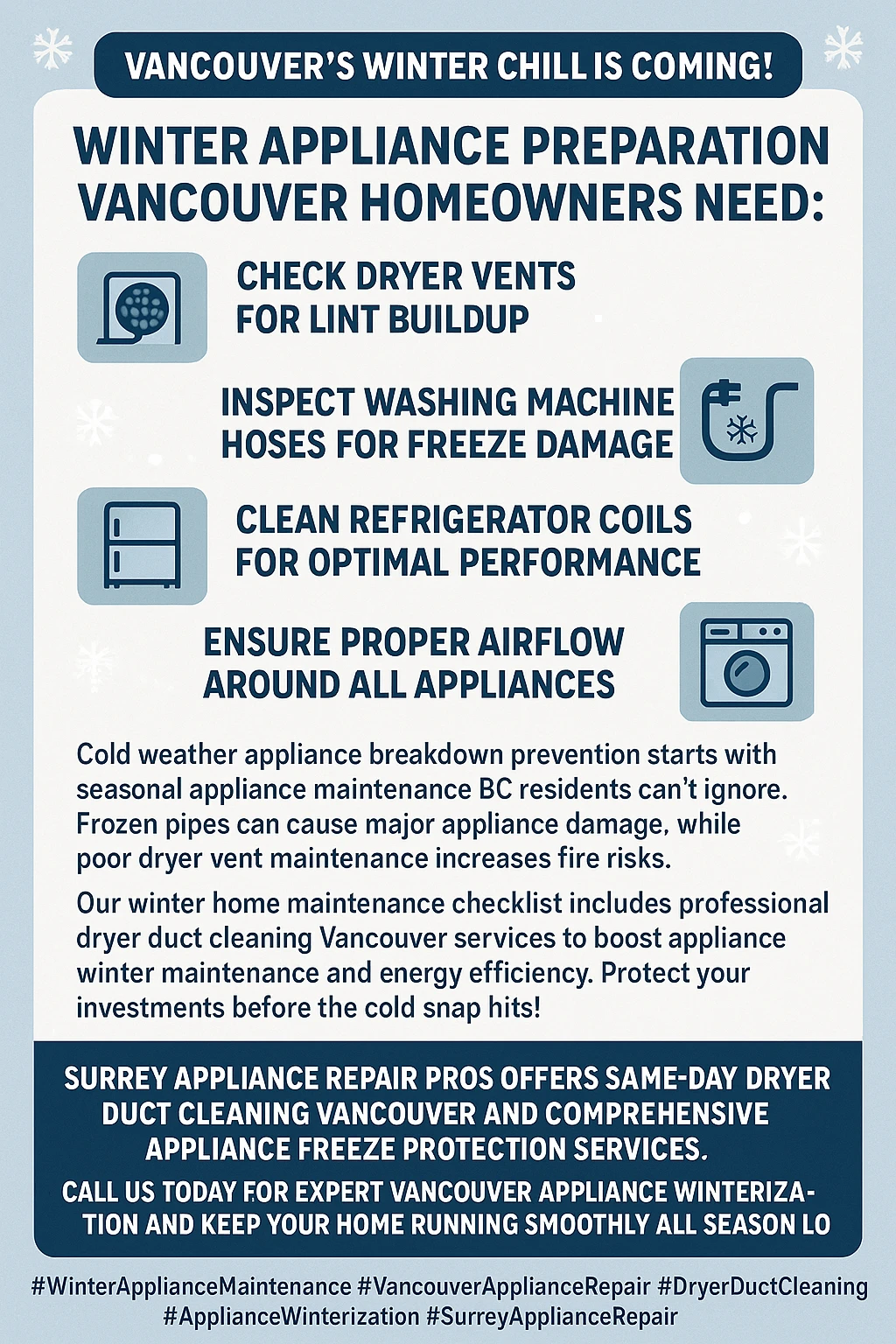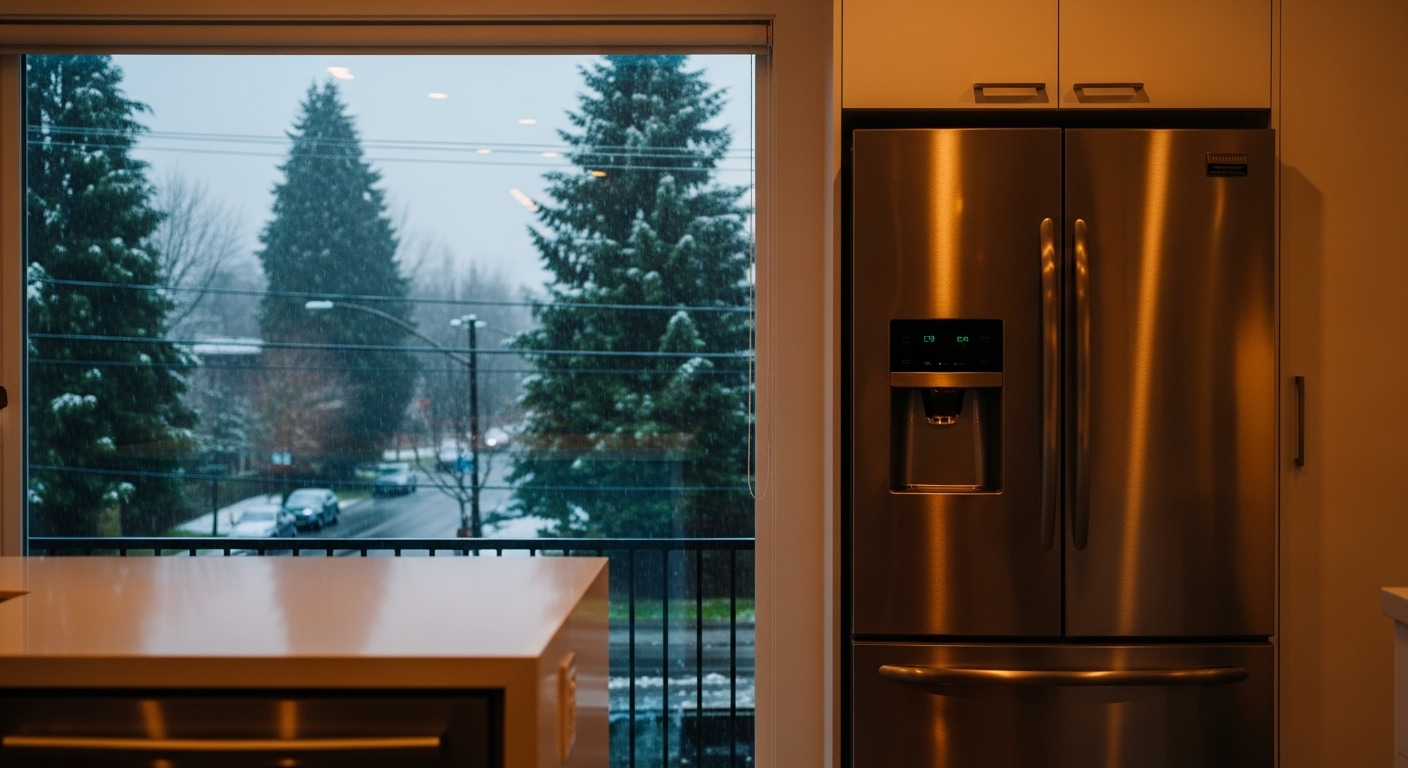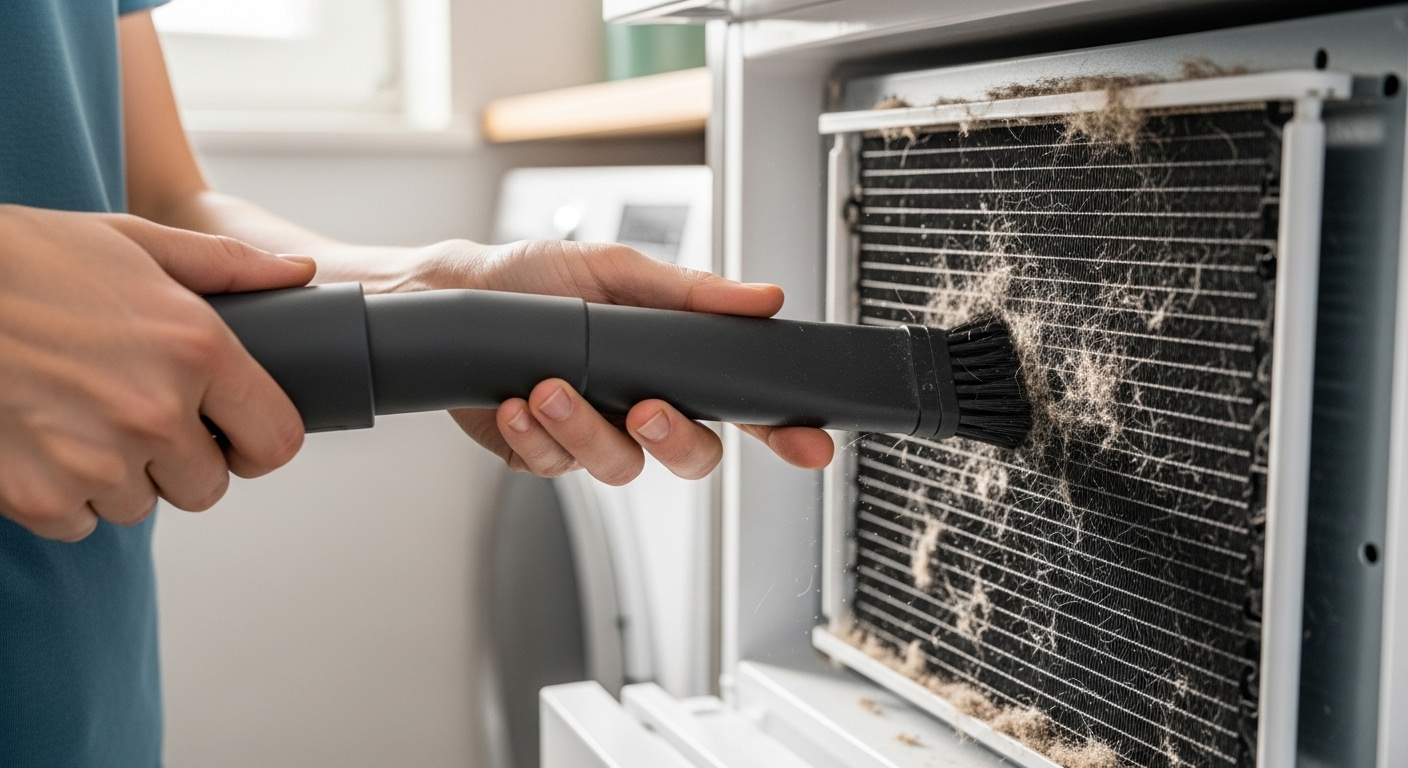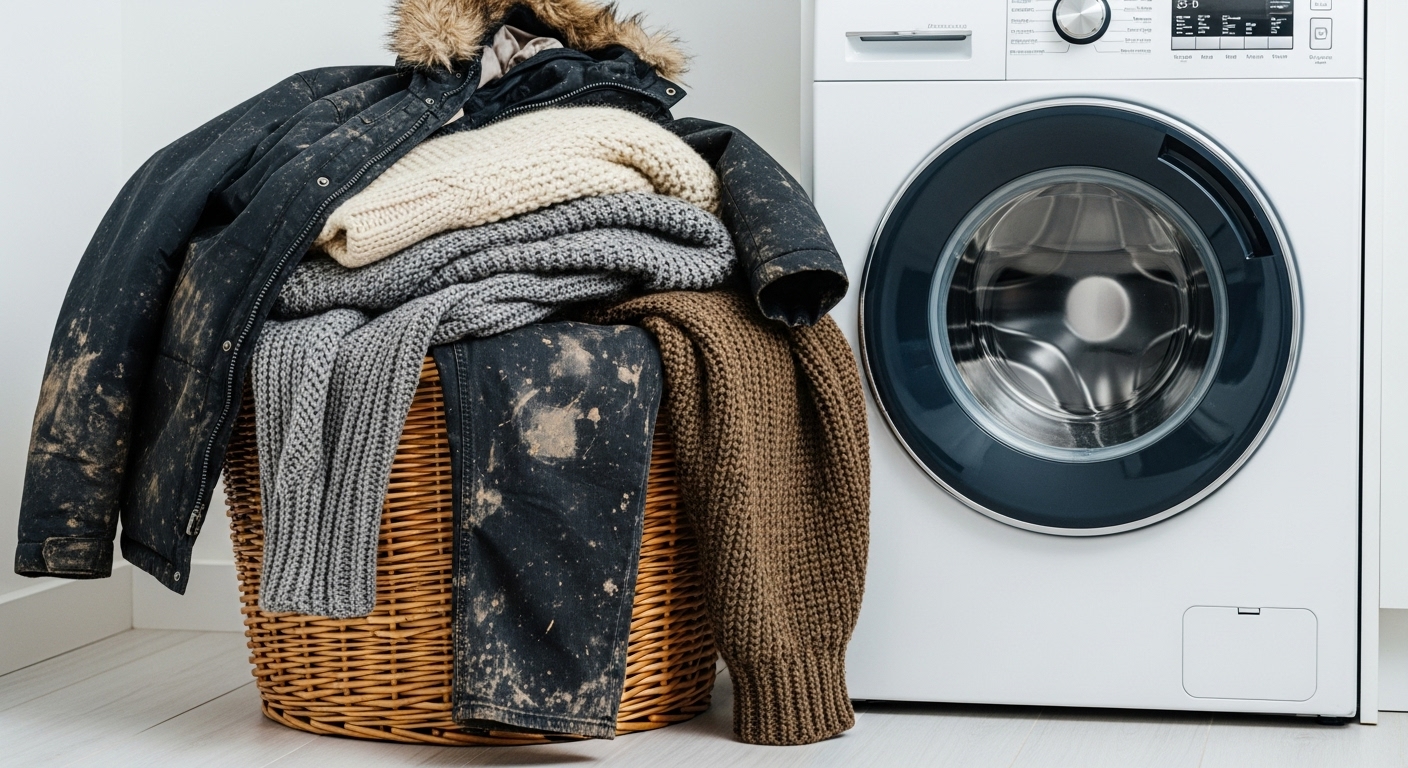Winter Appliance Prep: Protecting Your Home’s Most Expensive Investments from Vancouver’s Cold Snap
Feeling anxious about your expensive appliances surviving another unpredictable Vancouver winter without breaking down when you need them most? Don’t panic – we’ve got the complete winterization strategy that’ll keep your household heroes running like champs through every freeze-thaw cycle and power surge that our notorious coastal weather throws at them!
Picture this: it’s January in Vancouver, the temperature has been ping-ponging between freezing rain and actual snow for weeks, and suddenly your washing machine decides to take an unscheduled vacation right when you desperately need to wash everyone’s muddy winter gear. As someone who’s witnessed way too many appliance disasters during Vancouver’s unpredictable winter months, I can tell you that most of these expensive headaches are totally preventable with some smart preparation. The thing about Vancouver winters is they’re sneakier than people think – we might not deal with the brutal minus-thirty temperatures that Calgary gets, but our constantly changing weather patterns actually create unique challenges that can destroy your appliances faster than you’d believe. What makes Vancouver winters particularly brutal on appliances isn’t just the cold – it’s the relentless back-and-forth between freezing and mild temperatures that really wreaks havoc on our household equipment. Your dishwasher’s heating elements work overtime when ice-cold water hits the system, your refrigerator’s compressor struggles against constant humidity changes, and don’t even get me started on what those freeze-thaw cycles do to washing machine hoses and seals. These aren’t just minor inconveniences either; they’re expensive disasters waiting to happen if you don’t take action before winter hits hard.
The secret to winter appliance success isn’t just about basic cleaning – it’s about understanding how Vancouver’s unique coastal climate affects your specific appliances and taking targeted action to protect them. From dealing with condensation issues that plague local homes during our wet season to managing the extra electrical load from holiday cooking and heating systems, this guide covers the maintenance strategies that actually work for Vancouver homeowners who want to avoid those heart-stopping moments when essential appliances fail during the worst possible weather.
Key Outtakes:
- Vancouver’s freeze-thaw cycles stress appliance components more than consistent cold temperatures, making targeted winterization essential for preventing breakdowns
- Cold water entering appliances forces motors and heating elements to work harder, significantly increasing energy bills and wear on expensive parts
- Simple preventive measures like cleaning coils, checking seals, and adjusting water heater temperatures can prevent 80% of common winter appliance failures
- Holiday usage spikes combined with winter conditions create the perfect recipe for breakdowns – preparation before December saves emergency repair costs
- Professional maintenance for gas appliances and complex systems ensures safety and efficiency during peak winter usage

Understanding Vancouver’s Unique Winter Appliance Challenges
Vancouver winters present a perfect storm of conditions that many homeowners don’t fully appreciate until they’re facing a costly repair bill in the middle of February. Unlike the prairie provinces where temperatures stay consistently below freezing, Vancouver’s coastal climate creates constant temperature swings that put tremendous stress on appliance components. This week it might dip to minus-five overnight, then warm up to eight degrees by afternoon – a thirteen-degree swing that makes materials expand and contract repeatedly. Your appliances weren’t designed for this constant thermal stress, and over time, seals crack, connections loosen, and components fail prematurely.

The high humidity that comes with our winter rain creates another layer of complexity that separates Vancouver from drier climates. When warm, moist air meets cold appliance surfaces, condensation forms in places it shouldn’t be. This moisture can corrode electrical connections, promote mold growth in washing machines, and cause metal components to rust faster than they would in Alberta’s dry winter air. I learned this lesson the hard way when my three-year-old dishwasher developed a mysterious electrical fault – turns out condensation had been building up behind the control panel for months, slowly corroding the circuit board.
Cold tap water is perhaps the most overlooked winter challenger for Vancouver homeowners, yet it has massive implications for appliance performance and energy costs. When your water temperature drops from its summer high of around eighteen degrees to winter lows of six to eight degrees, your hot water appliances have to work significantly harder. Your dishwasher’s heating element runs longer cycles, your washing machine struggles to dissolve detergent effectively, and your hot water heater cycles more frequently to maintain target temperatures. This extra workload doesn’t just spike your hydro bill – it accelerates wear on expensive components and can lead to premature failure during the peak usage holiday season.
Essential Kitchen Appliance Winter Protection Strategies
Building on our understanding of Vancouver’s unique challenges, your kitchen bears the brunt of winter appliance stress, especially with increased holiday cooking and entertaining. The constant temperature fluctuations affect everything from how your refrigerator maintains consistent cooling to how efficiently your dishwasher cleans dishes with that frigid incoming water. Smart preparation focuses on the most vulnerable components and the appliances that work hardest during our wet, unpredictable winters.

Starting with your refrigerator and freezer, these workhorses face unique challenges when ambient temperatures drop and indoor heating systems create dry air. The rubber door seals become brittle in cold weather and can develop tiny cracks that let warm air seep in, forcing your compressor to work overtime. Test your seals monthly during winter by closing the door on a piece of paper – if you can pull it out easily, it’s time for replacement seals. This simple fifty-dollar fix can save you hundreds in energy costs and prevent a compressor failure that could cost eight hundred dollars or more to repair.
The condenser coils on the back or bottom of your fridge collect dust faster in winter when heating systems circulate more particles through the air. Dirty coils are like putting a winter coat on your refrigerator – they trap heat and make the compressor work harder. Clean these coils every three months during winter using a vacuum with a brush attachment, and you’ll improve efficiency by up to twenty-five percent while preventing overheating damage. Pay special attention if you have pets, as their winter undercoats shed more and can create significant coil blockages.
Your dishwasher faces the double challenge of cold incoming water and increased holiday usage, creating perfect conditions for inefficient cleaning and component stress. When water enters at six degrees instead of summer’s eighteen degrees, your dishwasher’s heating element works overtime to reach the sixty-degree temperature needed for effective cleaning and sanitizing. Run hot water at your kitchen sink until it’s steaming before starting a dishwasher cycle – this pre-warms the supply line and reduces stress on the heating element. Additionally, use dishwasher cleaner monthly during winter to remove mineral buildup that accumulates faster when heating elements work harder.
Food preparation appliances like ovens and stovetops see heavy use during the holiday season, and Vancouver’s humidity can affect their performance in unexpected ways. Gas appliances are particularly sensitive to moisture in the air, which can affect combustion efficiency and create uneven heating. Ensure your range hood is working properly to manage both cooking moisture and improve air circulation around gas burners. Electric ovens benefit from having their door seals checked – cold drafts from poorly sealed oven doors affect temperature consistency and force heating elements to cycle more frequently, leading to premature wear.
Laundry Room Winterization Essentials
Moving from kitchen appliances to laundry equipment, your washer and dryer face some of the most challenging winter conditions in your home. Cold water temperatures, increased humidity from wet winter clothes, and heavier fabric loads create a perfect storm of challenges that can lead to serious issues if you’re not prepared. Vancouver homes face the additional challenge of utility rooms that can get quite cold, especially those located in basements or areas that don’t receive consistent heating.

Your washing machine struggles significantly with cold water temperatures during Vancouver winters, as incoming water can drop below ten degrees. When water gets this cold, detergents don’t dissolve properly, fabric softeners can leave residue, and cleaning performance suffers dramatically. Modern high-efficiency washers are particularly affected because they use less water overall, meaning that cold water has less opportunity to warm up during the cycle. Consider adjusting your water heater temperature to fifty-four degrees during winter months to ensure adequate hot water delivery, but be cautious not to go higher as this creates scalding risks and wastes energy.
Winter also means washing heavier items like coats, boots, and muddy outdoor gear tracked in from Vancouver’s wet streets. These items put extra stress on your washer’s motor and suspension system, so distribute heavy items evenly in the drum and resist the temptation to overload just because you’re washing bulkier pieces. A single heavy coat should be washed with a few lighter items to balance the load – unbalanced loads cause excessive vibration that can damage drum bearings and create expensive repair issues.
Your dryer faces winter challenges that many homeowners never consider, yet dryer

